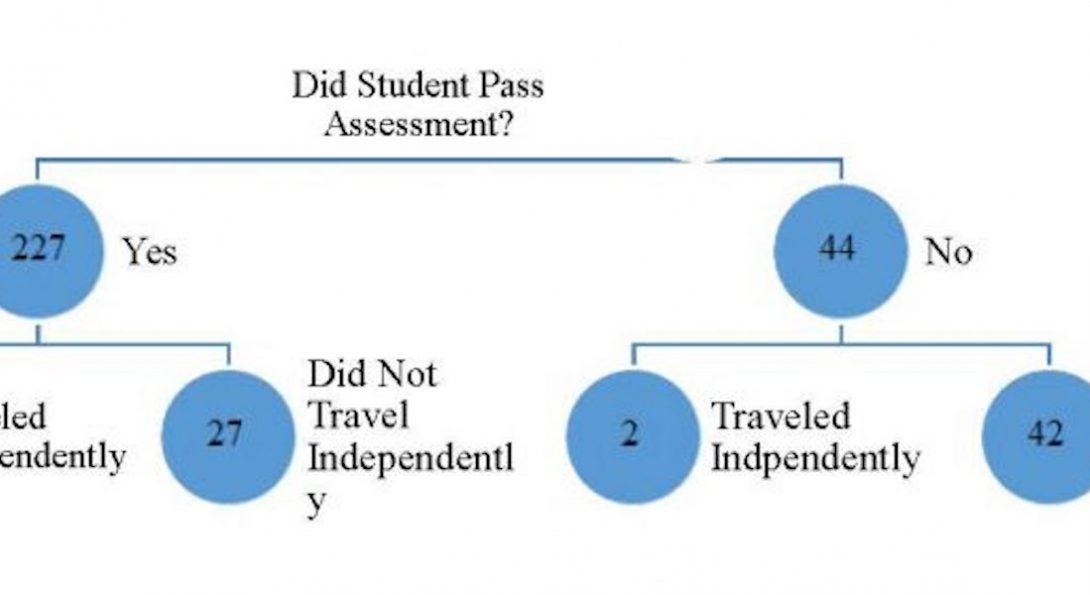Framework and Evaluation Process Can Help CPS Develop Travel Training Program Leading to Enhance Student Mobility, Independence

Guidelines Outlined in Research Report From Urban Transportation Center at UIC
The current travel training program (TTP) designed to help Chicago Public School (CPS) special needs students navigate public transportation independently can be enhanced through a revised structure that measures the program’s merits, improvements and compliance.
Researches came to that conclusion by building a “logic model” or formal process to evaluate the effectiveness of the program and an integrated theory-driven framework for future implementation of a revised TTP. The findings are outlined in “CPS Travel Training Evaluation Project,” a report designed to assess the potential costs and benefits of expanding the current program.
A team from the Urban Transportation Center at the University of Illinois at Chicago completed the study through two tracks: a) Developing the logic model and framework, which included a literature review of relevant scholarly reports; and b) Analyzing existing CPS data on travel training programs.
As noted in the report, TTPs can teach qualified students how to safely used fixed-route bus and subway lines to get to and from school and other activities versus relying on expensive paratransit bus service. Visit the project abstract and download the complete CPS travel training report.
Well-managed programs can provide benefits to the students, school district and society. “Movement of disabled riders to fixed public transit systems reduces demand of costly paratransit programs, increases the ability of disabled clients to function independently, and may have a multitude of other benefits,” the report stated.
The logic model and framework developed is structured around these three key components:
- Data Repository. Preparation of a repository of data related to students using the TTP, how the service is developed and delivered, and the actual or potential results of travel training programs. This information would evaluate program benefits more effectively by providing insight on student commuters and potential travel training variables.
- Operational Aspects. The ability to determine operational aspects of a program – when, how and why they work – to provide information on effectiveness and efficiency. Insight gained can help make revisions and improve production and delivery.
- Contract Information. Collection of information and knowledge that school districts can use when engaging in contracts with providers from the government, nonprofits or private companies. Data through these sources also would provide resources to provide ongoing oversight of the TTP.
The analysis of CPS travel training program data gave researchers insight into the effectiveness of the program, along with how to make the program better and recommend more encompassing oversight procedures.
The findings revealed in part:
- Through a cost-benefit analysis, Chicago Public Schools would save $2,957,911 annually if special needs students who participated in the TTP would travel on public transit independently and pay the regular public transit student rate.
- A total of 200 of 227 (or 88.1%) students who passed a CPS assessment and completed training later began traveling independently.
- Of students approved to travel on their own, 25% did not because their parents would not allow it.
The project was coordinated by UTC Director Dr. P.S. Sriraj and Dr. Eric Welsh, Director of the Center for Science Technology and Environmental Policy Studies and Professor of Public Affairs at Arizona State University. They were supported by Chul Hyun Park, a PhD student at Arizona State University, and former UTC graduate research assistant Brian Tompkins, MPA.
The Urban Transportation Center at UIC is dedicated to conducting research and education and providing technical assistance on urban transportation planning, policy, operations, and management. The UTC is part of the College of Urban Planning and Public Affairs, a nationally-recognized innovator in education, research, and engagement in support of the nation’s cities and metropolitan areas. Learn more by visiting www.utc.uic.edu.